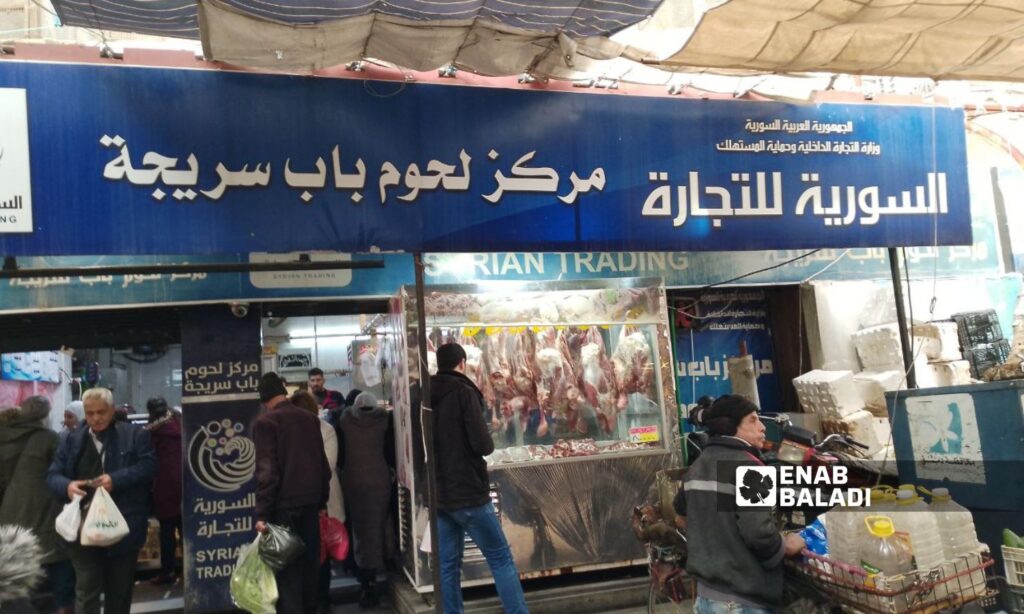Enab Baladi – Sarah al-Ahmad
On a street stand for bones in Bab Sreijeh, in the center of Damascus, Khalid (60 years old) stands with only 25,000 Syrian pounds in his pocket, trying to pick a bag of bones with some scant meat remnants on them.
Khalid, who works for the Directorate of Water, does not earn more than 250,000 Syrian pounds and is married with three daughters, one of whom is married. He told Enab Baladi that meat has not entered his house for about a year, as his family depends on adding a meat flavor to their food by putting bones in it.
Khalid only buys bones when needed, and depending on the dish that will be prepared, explaining that what drove him to buy this material this time was a visit from his married daughter with her husband.
Residents of Damascus resort to buying bones as an alternative to meats, which are sold within popular markets such as Bab Sreijeh market, al-Darawish street, and others, with a complete absence of supply control monitoring. People scramble to buy them, while butchers stand at their shop doors waiting for a customer to buy meat.
People resort to buying bones due to their cheapness and their need for them amidst rising meat prices, as the price of a kilo of sheep meat reached 220,000 Syrian pounds, and a kilo of beef to 200,000 Syrian pounds, in a context of low purchasing power that forces people to change their dietary habits.
The US dollar is trading at 14,650 SYP according to the S-P Today website, which covers the trading rate of the Syrian pound to the dollar. At the start of the conflict in 2011, the dollar was trading at 47 pounds.
A bone for every dish
Nawal (45 years old), a resident of Damascus and a housewife whose husband is a cleaner (who requested her full name not be mentioned), told Enab Baladi that her family has not consumed any kind of meat for five months, as their exorbitant prices do not fit with her husband’s income, which is 200,000 Syrian pounds monthly, while the price of a kilo of sheep bones reaches 10,000 Syrian pounds, making it a good alternative to meats.
Nawal added that the bones give the food some richness, noting that she buys about two kilograms per month and uses them to cook soups and some traditional dishes, cooking one bone from the kilo with each dish.
Alternatives for kibbeh stuffing
Residents of Damascus also depend on some alternatives of questionable cleanliness, such as ground chicken bones or potatoes cooked with fat, which people use to stuff kibbeh and sambousek. The price per kilogram of such a mix is 4,000 Syrian pounds. Some also buy unwanted parts of chicken (crushed bones mixed with skin and fat).
Louay (49 years old), a butcher in Damascus, told Enab Baladi that the unwanted parts of chicken were previously taken for dogs and cats, along with chicken feet, bone remnants, and fat. However, today the demand for it has increased for human consumption due to the high prices of meats of all kinds.
The price of a kilo of these parts reaches 40,000 Syrian pounds, and chicken feet to 15,000 Syrian pounds.
Louay also confirmed that bones were previously used but not sold; poor families would request them and they were given for free. Yet today, due to the increased demand due to high meat prices, they are sold at the stands of meat shops.
He added that in his shop, only four or five people enter per day, who ask for an ounce of meat or half an ounce. Often, the whole day goes by selling only one kilogram of meat, and the remaining meat is placed in a special fridge inside the shop.
Mating season drives prices up
The head of the Damascus Butchers’ Association, Mohammad Yahya al-Khin, confirmed that the rise in meat prices has affected the sales volume at most butcher shops, attributing the reasons for the price increase to the scarcity of supply coinciding with the start of the transitional mating period for sheep and going through the pregnancy and birth period, which lasts three months. Additionally, the opening of export doors for male sheep has doubled the price during this significant transitional period, thereby playing a prominent role in raising prices at the start of the new year, he said.

